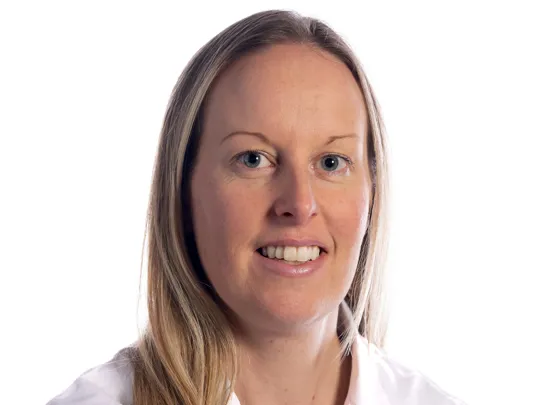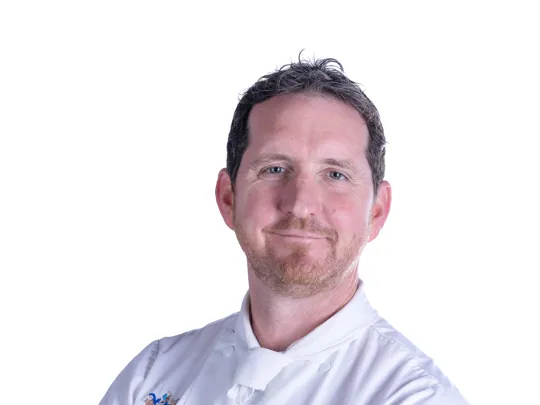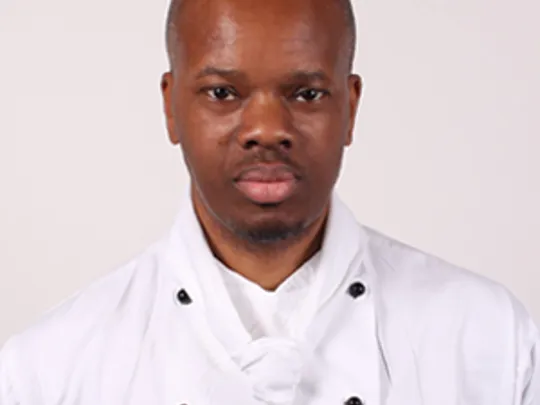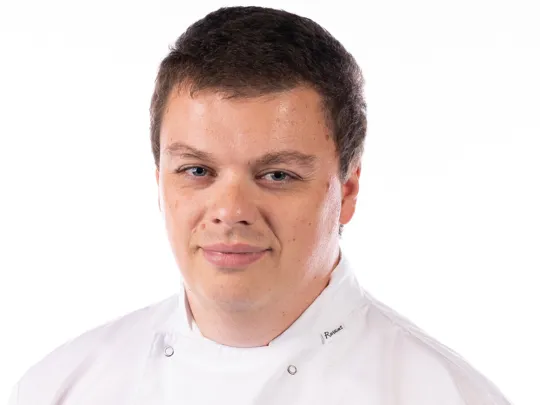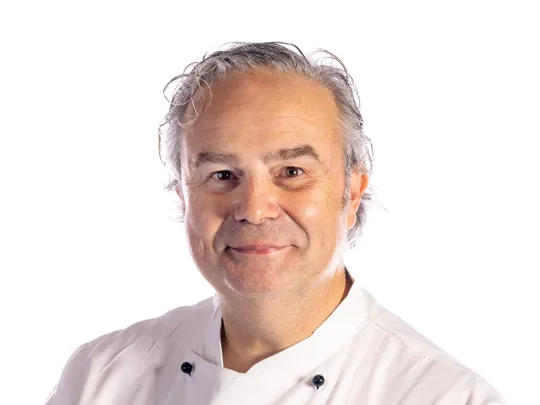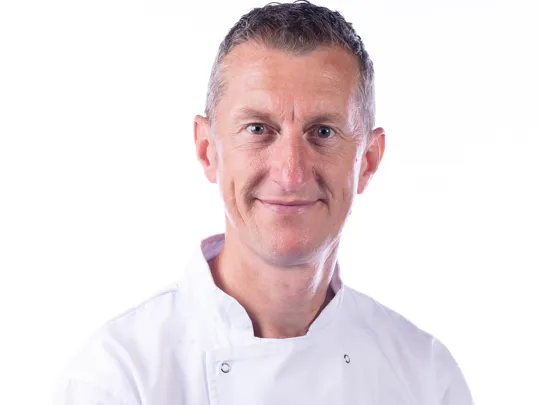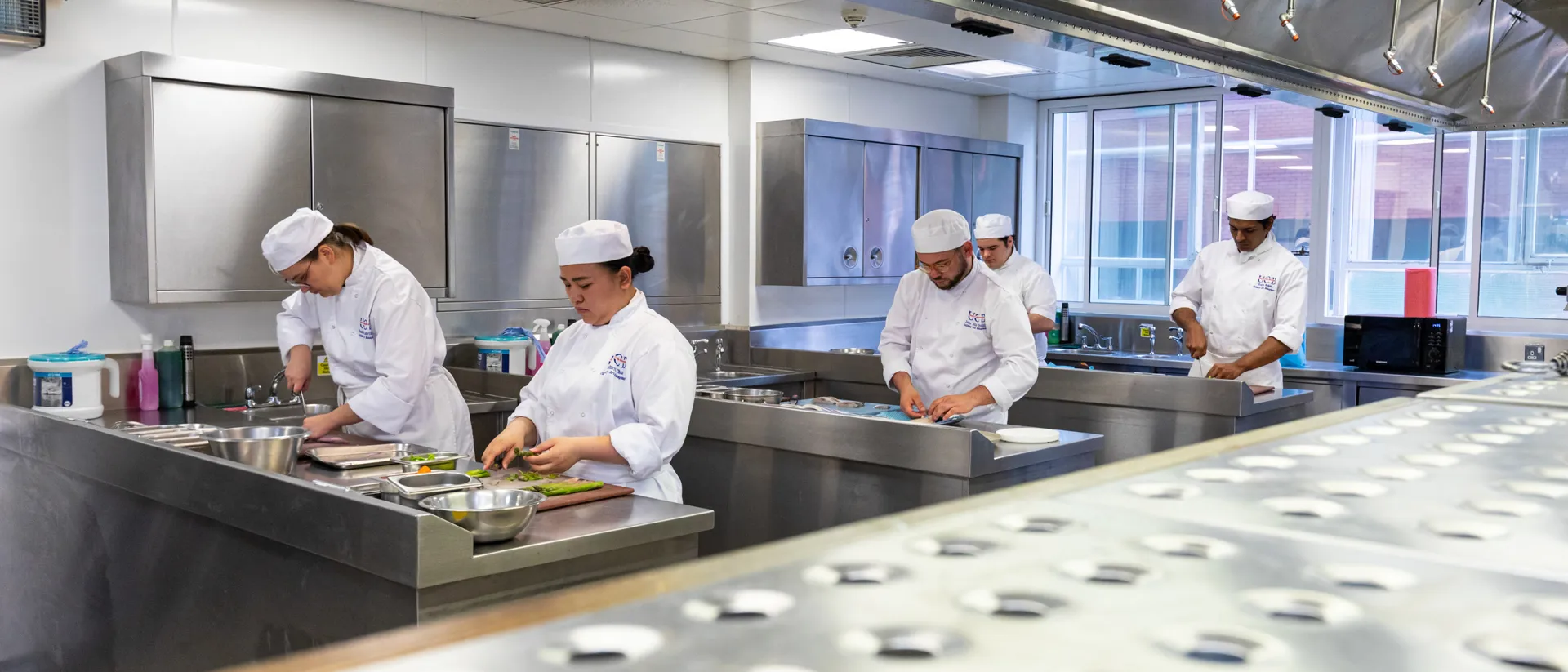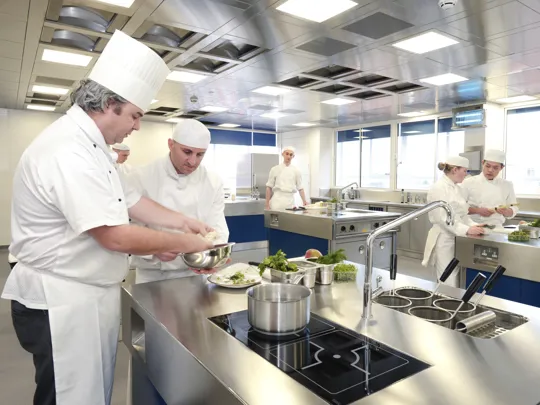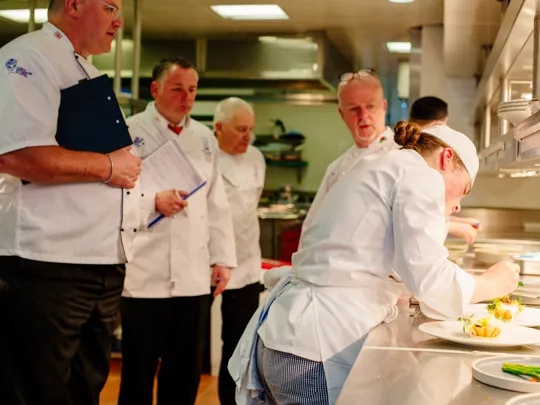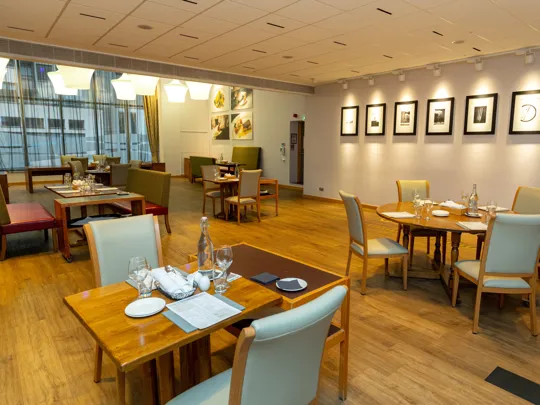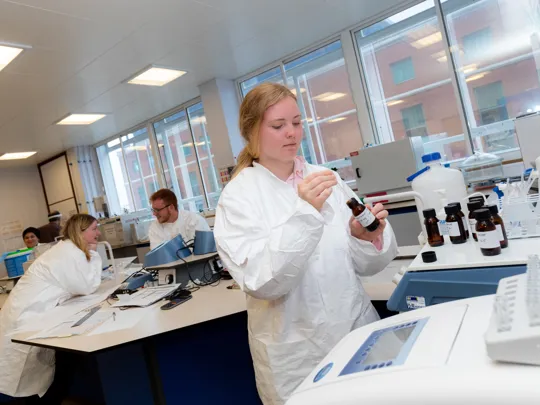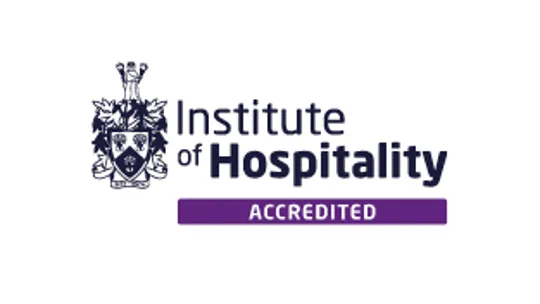of graduate employers say relevant experience is essential to getting a job with them

Former College of Food student Ben Robinson Young
Student stories: Ben Robinson Young
Along with his partner, Kaisia Piatkowska – who he met on the University’s Culinary Arts Management degree 13 years ago – Ben launched Tropea Italian restaurant in Harborne, Birmingham, which has been named among the Good Food Guide’s Britain’s Best Local Restaurants.
Ben, who works front of house while Kaisia is head chef, said: “Our degree absolutely shaped our future and gave us the skills and confidence to follow our dream of opening a restaurant.
"What we learned over four years cooking, doing basic accounts and costings and business planning has been invaluable. We're now the proud owners of a successful business, which is down to our fantastic lecturers and the start they gave us.”
Discover more about Ben:
Why should I choose to study Culinary Arts Management BA (Hons) / FdA?
- WORK PLACEMENT – Boost your employment prospects through a paid one-year placement in the culinary arts industry, with opportunities around the world
- PRACTICAL APPLICATION – Take on opportunities such as working at Michelin-starred restaurants (e.g. Simpsons, Opheem), supporting product development with major firms like Mars or working in our outstanding campus restaurant
- COMPETITIONS – Prove your abilities in a range of industry competitions – you could follow in the footsteps of our past winners at Nestlé Professional Toque d’Or (five-time winners), Zest Quest Asia (two-time champions), BCF Young Chef of the Year and many more
- ENRICHMENT – Enjoy a variety of visits and masterclasses by celebrated chefs and food industry experts
- AWARD-WINNING UNIVERSITY – Study at the highest-ranking university in the region according to student choice (Whatuni Student Choice Awards 2024)
Our facilities
University College Birmingham is renowned for its outstanding food industry training facilities. Studying our Culinary Arts Management course means you will have access to our professional standard kitchens, award-winning training restaurant and state-of-the-art food development facilities.
Course breakdown
Students on the FdA have the option of progressing onto the final year upon completion of the foundation degree.
- Year 1
- Year 2
- Year 3
- Year 4
Core Modules
Culinary Skills Development
This module provides you with the essential skills and knowledge needed for professional food preparation, menu design, ingredient selection, and kitchen management. You will master fundamental cooking techniques, including knife skills, cooking methods, and recipe development. You will also explore menu planning and execution, ensuring dietary inclusivity and efficient service management. The module emphasises ingredient sourcing, baking fundamentals, and emerging culinary trends, such as molecular gastronomy and plant-based cuisine. Additionally, you will develop professionalism, teamwork, and leadership skills, while adhering to strict hygiene and food safety regulations to maintain high industry standards. Through hands-on practice and real-world applications, you will refine their culinary artistry, plating techniques, and problem-solving abilities to thrive in dynamic kitchen environments.
Employability Enhancement
This module explores key aspects of employability in the hospitality industry, beginning with an understanding of employer expectations and industry insights, including recruitment trends and the essential skills and attributes valued by hospitality employers. You will develop competencies for career success, focusing on both technical and soft skills, as well as professional behaviours required in the workplace. You will use competency frameworks to evaluate your employability skills, identify strengths and areas for improvement, and set SMART career goals to support continuous learning and development. Finally, the module emphasises career advancement and personal branding, guiding you in creating a strong professional identity, building an online and offline presence to maximise employment opportunities.
Food and Beverage Sector Trends
This module explores the food and beverage (F&B) hospitality sector, equipping you with the knowledge and skills necessary to understand industry operations, safety regulations, management strategies, and customer service excellence. You will gain insight into the structure of the food and beverage industry, key operational practices, and emerging trends shaping the sector. The module also emphasises critical areas such as food safety, quality control, legal compliance, and ethical considerations.
Food Procurement Management
This module covers the essential principles of food procurement, vendor management, supply chain logistics, and sustainability. You will learn strategies for sourcing food supplies, evaluating suppliers, negotiating contracts, and managing costs. The module emphasises the importance of nutrition in procurement, addressing dietary considerations and promoting public health in various institutions. You will explore sustainable sourcing practices, ethical procurement, and the environmental and social responsibilities involved in food supply chains. Through this comprehensive approach, you will develop the skills needed to manage food procurement processes effectively while balancing financial, health, and sustainability concerns.
Kitchen and Restaurant Operations
This module provides an overview of kitchen and restaurant operations, focusing on key areas that ensure efficiency, quality, and safety in a culinary setting. You will learn to use standardised recipes for consistent food preparation and presentation, and explore control systems to optimise resources, improve workflow, and reduce waste. The module also covers food hygiene and safety compliance, ensuring you apply industry standards to maintain a safe environment. Additionally, you will develop teamwork and problem-solving skills to collaborate effectively and handle challenges in a fast-paced culinary environment. Through self-reflection, you will identify areas for personal and professional growth.
Kitchen Costs and Profitability
This module introduces you to food costing, financial management, and marketing within the hospitality industry. You will learn to calculate food costs, gross profit margins, and VAT accurately, while applying menu engineering techniques to optimise pricing and minimise waste. The module also covers labour cost forecasting, staffing rotas, and managing operational budgets to maintain financial sustainability. Additionally, you will explore marketing strategies for brand development and customer engagement, including effective use of social media and upselling techniques. With a focus on stock management, utility bills, and performance forecasting, this module provides you with practical tools and knowledge to manage financial operations and enhance the profitability of hospitality businesses.
Work Placement
Work Placement
The work placement module provides you with the opportunities to develop practical skills, relate theory to practice and to gain a sound base of industrial experience. In addition, the module seeks to develop 'life skills' to assist you in progressing towards a career in management. The work placement period of 48 weeks offers you the opportunity to experience work in the Hospitality industry in the UK, opportunities abroad and to gain academic credit for your learning.
Core Modules
Contemporary Management Principles
The hospitality industry faces a huge challenge in terms of adapting and promoting services in an interconnected world. In this module you will examine the tactics, strategies, and ways that marketing managers use media communications to secure business. This research approach will extend into exploring the practical and theoretical people management skills required by 21st century managers to maximise the success of their business, through their most important resource: the people. You will explore the role of the manager throughout the employment journey and evaluate best practice procedures to attract and retain your staff. The comprehensive approach to the module also allows you to utilise and practice the many aspects of financial control, designed to prepare you for the rigour and competencies required within the role of Kitchen Manager, Head Chef or Financial Controller.
Culinary Investigations
This module will give you a foundation in research principles and methods, learn to develop strong research ideas and proposals, and explore different research methods. You will review the importance of research ethics and develop data collection, analysis, and interpretation skills. You will learn and prepare to use digital tools and multimedia to enhance your research, delivering engaging and impactful presentations.
Fusion Menu Creation
This module explores global menu development and the culinary influences that shape the hospitality industry. You will learn how menus serve as marketing tools and reflections of culinary identity, while examining world cuisines, food cultures, and traditional dishes. Key topics include menu planning, technical development, and the impact of globalisation and migration on menu design. You will gain practical skills in structuring various menu formats, incorporating sustainability, and maintaining consistency in recipe execution. The module also covers menu engineering, performance analysis, and adapting menus for diverse markets, with a focus on sustainable sourcing, ethical practices, and responding to evolving consumer preferences.
Liquidology - The Beverage Collection
This module provides an in-depth exploration of the beverage industry, covering alcoholic and non-alcoholic drink categories, production methods, service techniques, and industry regulations. You will gain knowledge of the historical and cultural significance of beverages, develop sensory evaluation skills, and learn responsible service practices. You will examine emerging trends, sustainability, and business strategies in beverage operations, preparing students for careers in hospitality, food and beverage management, and related industries.
Management of Food and Beverage Operations
In this module, you will have the opportunity to apply management principles in a 'live' realistic working environment situation. You will be expected to demonstrate managerial skills to ensure the execution of a successful operation and will have to exhibit effective teamwork and collaboration skills throughout each stage. Upon completion of the module, you will also understand industry requirements with regard to managing safely and effectively and complying with all relevant legislation and industry policy.
Plus one option from:
Creative Events Planning and Design
This module introduces you to the essential skills needed for planning events in the hospitality industry. You will learn about different types of events, such as weddings, conferences, and festivals, and the process from planning to execution. You will explore how to create event concepts, select venues, and develop timelines and checklists for smooth organisation. The module covers budgeting for events, including managing costs and income from sources like ticket sales and sponsorships, as well as marketing strategies such as social media and event branding. You will also learn how to manage vendors and teams, communicate effectively with clients and stakeholders, and handle health, safety, and sustainability considerations to ensure eco-friendly and inclusive events.
Creative Kitchen Management
This module provides an in-depth exploration of kitchen operations, menu planning, culinary innovation, and effective staff management. You will gain practical skills in kitchen workflow, equipment uses, and organisational efficiency while learning to design creative, cost-effective menus that reflect current trends and customer preferences. The module emphasises sustainability, innovative cooking techniques, and effective cost control, preparing students to balance creativity with business considerations. Additionally, you will develop leadership, communication, and marketing skills to manage kitchen teams and promote their culinary creations.
Food Photography for Digital Engagement
This module covers the essential skills needed for food photography, including technical camera techniques, food styling, post-processing, and commercial applications. You will learn how to master lighting, composition, and advanced photography techniques like focus stacking and macro photography. You will explore creative food styling, using props and backgrounds to enhance food presentation, while also developing editing skills to produce polished, professional images. Additionally, you will gain experience in commercial food photography, learning how to tailor images for branding, social media, and marketing purposes, and building a professional portfolio for future clients.
Professional Pastry Techniques
The area of patisserie is highly specialised and it can take many years to develop the required technical skills. This practical module introduces you the fundamental techniques of professional pastry production, including the art of tempering chocolate, mastering boiled sugar, and showcasing creativity with fresh, seasonal fruits. You will craft modern plated desserts, drawing on standardised recipes and adapted classical methods, all while incorporating contemporary industry trends to appeal to diverse and sustainable target markets.
Core Modules
Culinary Entrepreneurship Management
This module focuses on the unique challenges for entrepreneurs of running small businesses in the hospitality industry. You will learn how to choose the best locations based on local demand and resources, as well as key financial skills such as raising finance, creating business plans, and making decisions for long-term success. The module also covers important legal requirements like food safety standards and licenses, along with design and operational strategies to improve customer experience and business efficiency.
New Product Development
This module offers a detailed journey through the stages of food product development—starting with conceptualisation and prototyping, moving through testing and refining, and culminating in the final product launch. As part of this, you will engage in the design and creation of an original food product, complemented by a prototype of its inventive packaging. Through this immersive experience, you will have the chance to channel your culinary creativity, innovation, and experimentation into developing practical food products, all set against the backdrop of a modern industry context.
Cross-Cultural Leadership Strategies
This module equips you with the skills needed to lead effectively in a globalised, multicultural business environment. You will explore the impact of globalisation on leadership, develop cultural intelligence (CQ), and learn strategies for managing diverse teams. Key topics include cross-cultural communication, leadership styles, conflict resolution, and ethical challenges in international business. By applying cross-cultural leadership theories to real-world scenarios, you will gain practical skills to navigate cultural differences, adapt leadership styles, and drive success in global organisations. This module is ideal for those pursuing leadership roles in multinational companies or global industries.
Culinary Research Project
This module empowers you to research, plan, and execute a culinary-related project. You will explore a contemporary topic within the culinary industry through both primary and or secondary research, developing valuable insights into its evolving landscape.
Plus one option from:
Financial Strategy
This module covers essential financial concepts for managing and analysing business performance. You will learn about working capital management, including its cycle and effective planning. The module explores debt/equity financing and cost of capital models, helping you to understand how businesses raise finance. Capital investment decisions are also discussed, focusing on investment appraisal, risk, and sensitivity analysis. You will also learn about public limited companies, interpreting published accounts, and analysing financial ratios such as profitability, liquidity, and capital gearing, while understanding the limitations of these financial metrics.
Franchise and Brand Creation
This module provides you with a comprehensive understanding of franchising and brand creation in the hospitality industry. It covers the essentials of the franchise business model, including the roles of franchisees and franchisors, legal frameworks, and the challenges and benefits of franchising. You will learn how to build a unique brand identity, create effective marketing strategies, and maintain brand consistency across franchise locations. Additionally, the module addresses strategies for expanding a franchise into new markets, managing finances, and ensuring quality control.
Gastronomy - Food, Identity, and Culture
This module offers a comprehensive overview of gastronomy, exploring its cultural, scientific, and business aspects. You will examine the evolution of food from ancient times to modern trends and learn about key figures in the culinary world. You will investigate the role of food in shaping identity, rituals, and global traditions, as well as issues such as cultural appropriation in cuisine. In addition, you will explore the science of food, including molecular gastronomy techniques like emulsification, fermentation, and sous-vide, as well as sensory science and flavour perception. With a focus on sustainability and ethics in food systems, including farm-to-table practices and ethical eating you will discuss how this impacts the business of gastronomy, including culinary tourism, fine dining, and food trends.
Health and Wellbeing in Food
This module explores the connection between food, health, and wellbeing, focusing on how food choices impact physical and mental health. You will learn about nutrition, dietary requirements, the role of food in disease prevention, and how to create balanced meals through examining food trends, sustainability, and the ethical implications of food choices.
The modules listed above for this course are regularly reviewed to ensure they are up to date and informed by industry as well as the latest teaching methods. On occasion, we may need to make unexpected changes to modules – if this occurs, we will contact all offer holders as soon as possible.
Entry requirements
Culinary Arts Management BA (Hons)
A-levels: An A-level grade profile of BBC.
BTEC: A BTEC grade profile of DMM. This can be achieved from either an Extended Diploma or a combination of smaller BTEC qualifications.
Tariff: Other Level 3 qualifications are accepted for entry. A minimum of 112 UCAS Tariff points will be required.
Access to Higher Education Diploma: 112 UCAS Tariff points, including a minimum of 15 Level 3 credits at Distinction.
Culinary Arts Management FdA
A-levels: An A-level grade profile of CD.
BTEC: A BTEC grade profile of MPP. This can be achieved from either an Extended Diploma or a combination of smaller BTEC qualifications.
Tariff: Other Level 3 qualifications are accepted for entry. A minimum of 56 UCAS Tariff points will be required.
Access to Higher Education Diploma: 56 UCAS Tariff points.
Non-tariff: Non-UCAS Tariff-based Level 3 qualifications are also considered for entry.
Work-based: We also give equal consideration to applicants who are currently in work and wish to apply to University College Birmingham. To apply, they must have a minimum of 3 years' relevant work experience, demonstrating management or supervisory duties. The application must also include a reference from the student's line manager supporting their entry to higher education.
International students
For academic and English entry requirements for EU and international students, please visit the Country Specific Information page.
Please note: As an International Student, when choosing optional placement, a visa extension may be required.
Key information
Teaching and assessment
Note: Indicative information only – actual timetables and assessment regimes will be issued at your induction.
Teaching
Example of a typical teaching week (up to 19 contact hours):
- Large group teaching – 4 hours
- Smaller group teaching – 2 hours
- Practical kitchen session – 10 hours
- Tutorials – 1-2 hours
- Subject advice sessions – 2 hours
You will also need to commit around 20 hours per week for individual study time.
Assessment
Estimated breakdown of assessment for this degree course (weighting will vary in Year 3 and 4 depending on optional modules):
- Coursework – 48%
- Practical assessment – 42%
- Written examinations – 10%
Our teaching and assessment is underpinned by our Teaching, Learning and Assessment Strategy 2025-2030.
Timetable
We understand that you need to balance study with work, so wherever possible your lessons will be timetabled into 3-4 days a week in year one and three, and 3 days in your final year. Your second year will consist of a 48 week work placement.
Tuition fees for home students
If you are a home student enrolling on a bachelor's or foundation degree course at University College Birmingham, the 2025/2026 academic year tuition fee for full-time study is £9,535. For part-time study, the fee is £4,767.50.
Tuition fees for international students
If you are an international student (or have been fee assessed as an international fee payer) and are enrolling on a full-time [Band 1] bachelor's degree course in 2025/2026, the fee for the academic year will be £16,000. If you complete a placement year, there will be an administration fee of £500 for a full year or £250 for a half-year placement.
Uniform and kit costs
This course requires a uniform and kit costing approximately £250-300, depending on the items you purchase. (Prices are subject to change each year – exact costs and information on how to order required items will be provided to you prior to enrolment.)
Kick-Start Scheme
As a new student studying this course full-time, you will receive £300 per year through our Kick-Start Scheme (UK students only, eligibility criteria applies). This scheme will support your studies and future career by contributing to course-related materials, uniform or selected items on campus. You may also qualify for an additional £500 per year.
Find out more about the Kick-Start Scheme here.
Unibuddy Community - meet other students on your course
Starting university is an exciting time, but we understand that it can sometimes feel a little daunting. To support you, you will be invited to join our Unibuddy Community, where you can meet other students who have applied for the same course at University College Birmingham, before you start studying here.
As soon as you have been made an offer, you will be sent an invitation email to complete your registration and join the Unibuddy Community. For more information, check out our Unibuddy Community page.
Accreditations, endorsements and partnerships
University College Birmingham works with a wide range of organisations to ensure you receive the best possible training and qualifications recognised by industry.

Have questions around your chosen subject or course content? Are you wondering what you can expect to study as part of your course? Fill out our form and chat to a lecturer.
Work placements
Work placements are vital for gaining real-life experience and for building your confidence and skills before you finish your course – and they may even lead to a job when you graduate. Our HIRED team can help find the ideal placement for you.
Our FdA and BA (Hons) Culinary Arts Management courses both feature a one-year paid placement during your second year, during which you will not incur any tuition fees (a small fee is payable for international students). Opportunities are available in the UK or overseas.
The work placement module provides you with the opportunities to develop practical skills, relate theory to practice and to gain a sound base of industry experience. In addition, the module seeks to develop 'life skills' to assist you in progressing towards a career in management. The work placement period of 48 weeks offers you the opportunity to experience work in the Hospitality industry in the UK, opportunities abroad and to gain academic credit for your learning.
Work alongside experts in your sector
A snapshot of some of the employers we have worked with:
- White Barn Inn and Spa (Maine, USA)
- The Savoy (London)
- Gleneagles (Scotland)
- Celtic Manor (Wales)
- The Landmark (London)
- Ashford Castle (County Mayo, Ireland)
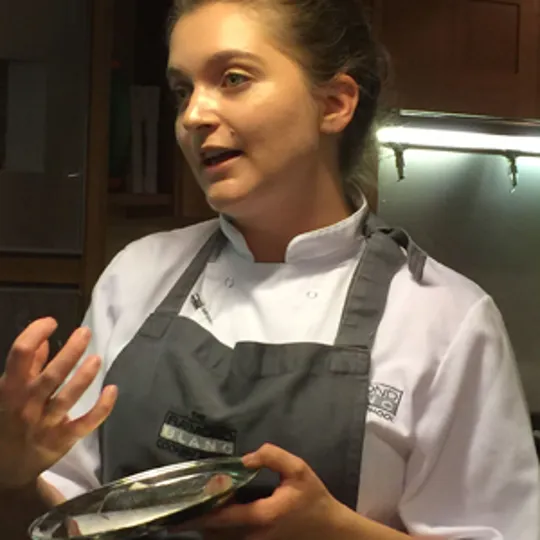
I always recommend this course to anyone with a passion for food or hospitality as it gives you such a wide range of tools and skills. I completed a year’s placement in New Hampshire, USA, during my degree course and am now senior tutor at the Raymond Blanc Cookery School.
Our graduate stories
Our students and alumni from our Birmingham College of Food and hospitality management are doing incredible things. Hear some of their fascinating stories below.
Career opportunities
The example roles and salaries below are intended as a guide only.
Head chef
Average salary: £35,000 - £50,000
Sous chef
Average salary: £30,000 - £40,000
Food business owner/restaurateur
Variable
Catering manager
Average salary: £22,000 - £45,000
Culinary arts lecturer
Average Salary: £39,239
Product development chef
Average salary: £25,000 - £40,000
Want to take your studies to the next level? Completing the BA (Hons) degree will enable you to move onto our postgraduate courses such as Culinary Arts Management MA/PGDip.
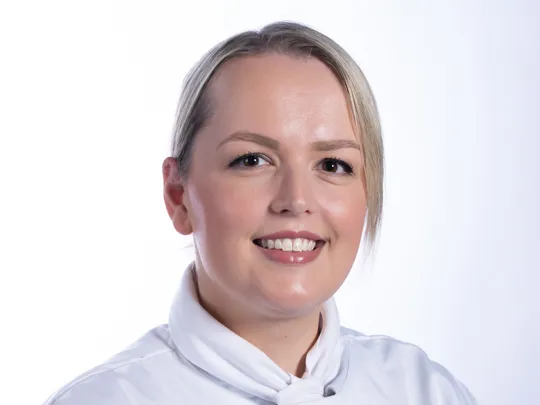
Eleny’s Story
Eleny joined the Culinary Arts Management degree in 2012 and then worked in Michelin-starred restaurants and food product development before returning as a lecturer.
Course statistics
BA (Hons)
FdA
Meet your lecturers
